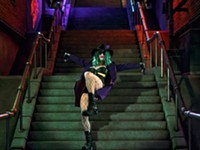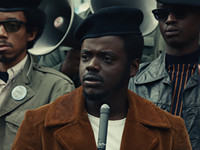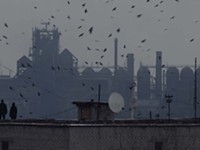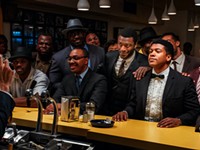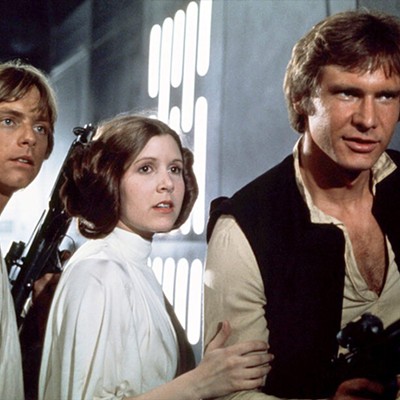[
{
"name": "500x250 Ad",
"insertPoint": "5",
"component": "15667920",
"parentWrapperClass": "",
"requiredCountToDisplay": "1"
}
]
A conflict between a high school teacher and her star pupil fuels the timely psychological drama "Luce." Confronting the issues of tokenism and race, it's a riveting and thought-provoking movie that resides entirely in gray areas, swirling in ideas of youth, class, and opportunity.
The film's plot is kicked into gear with an essay written by Luce Edgar (played by Kelvin Harrison Jr.), the exceptional, model student of his suburban Virginia high school. A refugee from Eritrea, Luce was adopted when he was 7-years-old by his white liberal parents, Peter (Tim Roth) and Amy (Naomi Watts). The film is somewhat vague about his early life, but it's suggested that he suffered some trauma in his war-torn homeland and even spent time as a child soldier.
Peter and Amy spent years with him in therapy, working to earn his trust and helping him overcome the horrors of his childhood to develop into the fine young man he is today. And by all accounts, they've done a great job. He's every bit the golden boy they dreamed he'd become: a star athlete, valedictorian, and well-liked by both peers and teachers alike.
But the lustrous veneer of his image threatens to crack after he turns in a rather incendiary paper to his history teacher, Harriet Wilson (Octavia Spencer). Given the assignment to write in the voice of a historical figure, Luce settled on Frantz Fanon as his subject. A pan-Africanist philosopher, Fanon argued that violence and brutality were sometimes a moral necessity in the fight against colonialism. Harriet's alarmed enough by the paper's content that she begins questioning Luce's picture-perfect exterior.
Her fears are compounded when she finds a bag of fireworks in the boy's locker. The combination of violent, revolutionary rhetoric and potentially dangerous explosives lead her to fear there may be a deeply-ingrained anger beneath Luce's friendly demeanor. That maybe the atrocities he was exposed to (or possibly committed) as a boy might have permanently altered his view of the world in a way that can't entirely be washed away.
We see the tightrope Luce is forced to walk in his daily life, the astronomical expectations placed on him, and the various lenses through which others view him. While talking with a white friend about another teammate, DeShaun (Astro), who was recently kicked off their track team for drug-related offenses, the friend brushes off the comparison Luce draws between himself and the other boy. His friend fumbles for an explanation for his dismissal, finally reasoning that DeShaun is "black, black." Understandably, Luce asks what that makes him. "You're just... Luce," the boy responds.
The story asks us to question what we think we know about people, leaving us to decipher what its character's motivations truly are. As Harriet continues her quest to uncover the truth, Luce's parents do whatever they can to defend their son against (what they come to believe is) a rogue teacher's malicious vendetta.
"Luce" is an adaptation of J.C. Lee's Off-Broadway play. Lee also acts as co-writer on the film, and the screenplay's dialogue sometimes has a stagey quality that can sound overwritten. Occasionally its characters are forced to spout ideas that threaten to make them feel like political talking points rather than real flesh-and-blood people. And a few of the story's plot developments seem designed deliberately to provoke, at the expense of some of the story's realism.
The film's at its best when it's delving into thorny ideas about the politics of respectability and the pressure faced by those in America who aren't white or lucky enough to be born here, to act as exemplary models of their particular race. Luce is constantly faced with people who want to turn him into a symbol to prove their own beliefs. But it's impossible to be everything to everyone.
Never lacking in ideas, the film also touches on rape culture, school security, systemic discrimination, and mental health. It gets into dicier territory with a related thread involving Stephanie Kim (Andrea Bang), a student whose sexual assault Luce may or may not know more about than he's letting on.
We also get glimpses into Harriet's personal life, as she deals with a sister (Marsha Stephanie Blake) in recovery. That plot leads to a scene of mental breakdown that I'm not entirely convinced doesn't tip uncomfortably into exploitative territory.
But the film is always exceptionally well-performed, by Harrison and Spencer in particular. Harriet and Luce each emerge as fascinatingly complex characters; two people with very different life experiences and ideas about how they're viewed by society. Through their characters, "Luce" becomes a story about the faces we choose to present to the world, the assumptions that get made about us, and the ones we hope never do.




